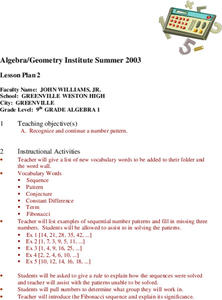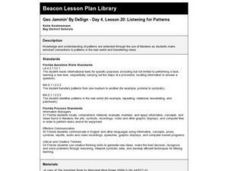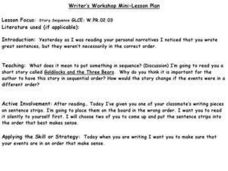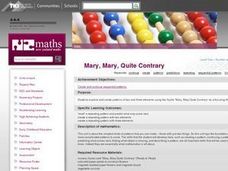Curated OER
Pattern Makers
Students are introduced to the notion of a repeating pattern. This is done by a number of means including the use of everyday objects. They are encouraged to create, describe and continue patterns.
Curated OER
Matchstick Patterns
Third graders investigate patterns made using matchsticks and tiles, so it involves them in active studying. The relation between the number of the term of a pattern and the number of matchsticks (tiles) that that tem has is explored...
Curated OER
Patterns and Sequences
Ninth graders examine sequential number patterns and the Fibonacci sequence. Given number patterns, they determine the next number in a sequence. Students develop their own number patterns and exchange them with another to be solved.
Curated OER
The Three Pigs
Second graders design and construct homes for the three pigs. Each of the homes is made and filled with patterns that we explore. They continue a sequential pattern and describe a rule for this.
Curated OER
Tukutuku Patterns
Students complete a series of lessons involving Tukutuku patterns, their rotations and area formulae. They determine the algebraic formulae for sequences. They use images as they work through the lessons to find the number of crosses in...
Curated OER
Letter Patterns
Second graders look at the number patterns we get from letters and numbers. They keep track of the numbers involved by drawing up a table of values. It's important here to look for the pattern and see how the number of tiles changes from...
Curated OER
Pede Patterns
Pupils generate number patterns for certain 'insects' from the mythical planet of Elsinore. Each 'Pede' is made up of square parts and has a number of feet. The patterns all link the number of feet and the number of squares. The students...
Curated OER
Add It Up Alligators
Students strengthen shape and pattern recognition, fine-motor and perceptual skills, encouraging imagination, play and sense of self within a group
Curated OER
Geo Jammin' By Design: Listening for Patterns
Students listen to the teacher read a book and participate with guided questions. They discuss patterns and how they repeat, by looking at quilts. They design their own quilt block to create a class quilt.
Curated OER
Investigating Patterns 2
Fifth graders investigate patterns and determine what symbol or number comes next. Using a given website, they play the "Pattern Quest" game. Students follow instructions and identify a secret pattern. Upon completion of work on the...
Curated OER
Cups and Cubes
Third graders explore the use of cups and counters as a model to analyze the effects of operations. They create and use a rule to create a sequential pattern and use cups and cubes to model the relationship.
Curated OER
Cannon Balls
Second graders investigate 2 and 3 dimensional objects. They discuss the characteristics of the triangle. Students create sequential patterns and describe the rule for their pattern.
Curated OER
Ants
Students make sequential patterns by using ants and following the model. They identify different parts of an ant by matching the picture to the word name. Pupils identify the ant's life cycle by creating a chart using pictures.
Curated OER
Ten Little Black Dots
Second graders use black and red construction paper to symbolize different one digit numbers that add up to 10. In this sums to 10 lesson plan, 2nd graders discover different combinations and patterns that can lead them to the number 10.
Computer Science Unplugged
Count the Dots – Binary Numbers
Did you know you can send a message using only zeroes and ones? This interactive resource presents an introduction to binary numbers. Through code cards, pupils learn to convert binary numbers to decimal numbers.
Curated OER
Jo's Table
Students continue a sequential pattern using a partially filled in table and simple addition exercise. They use problem solving strategies such as guess and check, make a table, look for patterns. They discuss their finding with the class.
Curated OER
Writers Workshop Story Sequence
Students read stories and explore the importance of sequential order. In groups, students are given sentence strips. Students holding the sentence strips, place themselves in a logical order to make a story. Individually, students...
Curated OER
Literature: Plot Patterns
Pupils read and analyze "An Occurrence at Owl Creek Bridge" for plot patterns. In a plot summary pyramid, they organize the story elements in sequential order. To illustrate plot summary techniques, students cite examples from...
PBS
Women's History: Parading Through History
Want to teach your pupils about debate, effective speech techniques, propaganda, and the women's movement? The first in a sequential series of three, scholars analyze real propaganda images from the the historic women's movement, view a...
Curated OER
Sequencing: Pictures Tell a Story
Students listen to a story and observe five illustrations of the main events drawn by the teacher. They arrange the illustrations in sequential order. Then, working in groups of five, they read stories and select five events, one for...
Curated OER
Mary, Mary, Quite Contrary
First graders use simple vegetable cut out and colored paper flower peddles to make simple patterns. They start out with a simple 2-element patterns around the theme of a daisy and increase in difficulty.
Curated OER
Colourful Jerseys
Students form a repeating pattern using shoe colour (eg., white, brown, white, brown). Without knowing what pattern they are using ask the students to join the line if they think that they could be the 5th member of the pattern. Ask them...
Curated OER
Philippine Banig Weaving
Students create a Philippine banig mat. As part of designing and creating the mat, the class is introduced to the tropical rain forest of the Philippines and how the environment impacts the lives of the people. Individuals also discover...
Curated OER
Geo Jammin' By Design - Day 7, Lesson 38: Kool Cups
Create geometric cups by interpreting directions, informational text, and mathematical concepts. Critical thinkers apply geometric theory (congruent shapes, patterns, symmetry) to actual directions to create a cup that holds Kool Aid....























